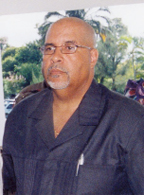Dr Richard Van West-Charles has spoken out against the region’s lapses in publicizing and celebrating its heroes, while addressing a ceremony “celebrating Burnham, Barrow and Bird” in Bridgetown, Barbados last month.

“In my judgement the region has not done enough to publicise and celebrate its heroes. More often than not the splendid achievements of our politicians and statesmen are often interred with their bones.
“An event such as this, therefore, must be recognized for what it is: it is an attempt to recapture for the young people of the region and beyond the celebrated feat of statesmanship by outstanding leaders of this region,” Dr Van West-Charles declared.
At the invitation of the Democratic Labour Party of Barbados, Van West-Charles participated in the regional day to honour Errol Barrow, Linden Forbes Sampson Burnham and Vere Bird as “nation builders” of the region.
In his address on January 21, Van West-Charles said he was certain that the organizers of the event would recognize that in future ceremonies of the kind “other nation builders will be accorded similar accolades.”
Among those in attendance were Prime Minister of the Commonwealth of Dominica, Roosevelt Skerrit, who is currently chairman of Caricom; Prime Minister David Thompson of Barbados; Assad Michael, Member of Parliament, and former Prime Minister Lester Bird of Antigua, son of Vere Cornwall Bird, the founding father of Antigua’s independence.
Van West-Charles also attended the Errol Barrow Day ceremony, which included the Errol Barrow memorial lecture and award ceremony. The lecture was delivered by Professor Woodville Marshall the previous day at the Tom Adams Financial Centre.
Former Commonwealth Secretary General and Minister of Foreign Affairs of Guyana, Sir Shridath Ramphal, was also present.
In his address, Van West-Charles acknowledged that, “My generation regarded the early leaders of the region as true giants in name and nature. . .”
He said further that “It is a well known fact that Linden Forbes Sampson Burnham of Guyana, Errol Walton Barrow of Barbados and Vere Cornwall Bird of Antigua did not regard independence as an end in itself.”
Van West-Charles pointed out that not soon after the attainment of this milestone all these leaders roused themselves and sought the integration of the English-speaking Caribbean.
And highlighting the background against which they pursued this idea, he observed that from most of the people of his generation the collapse of the West Indies Federation was something of a distant memory.
“It was not so for these committed West Indian integrationists,” Van West-Charles noted.
Collapse
“The collapse of the federation had grave psychological implications for the region and it laid bare the fact that the region was entering the uncharted waters of international life in a state of disarray. This concentrated some of the most eminent minds of the region,” Van West-Charles contended.
He went on to point out that the drive for an integrated and united Caribbean region has been vindicated.
“A unified region has been able to encompass many important achievements in the field of international relations. The Caribbean Community and its member states occupy an honourable place in many international organisations and fora such as the United Nations (UN), the Organisation of American States (OAS), and the Commonwealth. Not only has the Caribbean been effective members of these organisations but it has led some of its finest sons and daughters to them, such as Dame Nita Barrow, Sir Shridath Ramphal.”
Van West-Charles maintained that at the end of the day, however, “the Caribbean Community is strong to the extent that each of its member states is strong. The legacy left by Burnham, Barrow and Bird has stood the region in good stead.”
And since the attainment of independence, Guyana, Antigua and Barbados have been mobilizing their populations and equipping their people to fashion societies in which their citizens can achieve their full potential, he argued.
But it has been a fairly lengthy and difficult struggle punctuated by a number of crises, Van West-Charles observed. “The economic crisis of the 80s caused a deferment of a number of dreams, aspirations and goals. And the onset of globalization and the demands required towards its adaptation have brought new challenges.”
In spite of this, Van West-Charles noted, the member states of the Caribbean Community have not been daunted by them. And responding to globalization the member states of the community have embarked on “the new phase of the integration process and have set as their goal a construction of a Single Market and Economy.”
According to Van West-Charles, these facts serve to identify the “resilience and sense of purpose of the member states of the Caribbean Community.
“I believe that such resilience and purpose have been infused with a spirit of independence, determination and a determination to succeed. I submit to you that these were the attributes of Linden Forbes Sampson Burnham, Errol Walton Barrow and Vere Cornwall Bird.
Van West- Charles said this was the legacy that they had bequeathed to their countries and their region.
In opening his address he referred to overpowering tragedy in earthquake-shattered Haiti and acknowledged that the international community had reacted with great generosity, including the response of his own country, Guyana, as well as the measures taken by Caricom. But, he added, “in the long term the people of Haiti will have to reconstruct and refashion their society.”
Van West Charles was a former senior health minister during the PNC administration and the son-in-law of the late President Forbes Burnham. After taking an early retirement from PAHO/WHO, where he had been working for some 18 years, he announced his return to active political and community life in Guyana last year.
